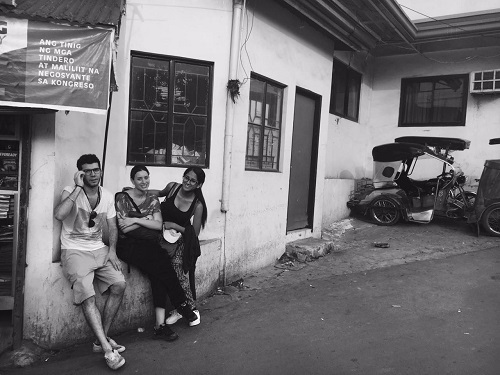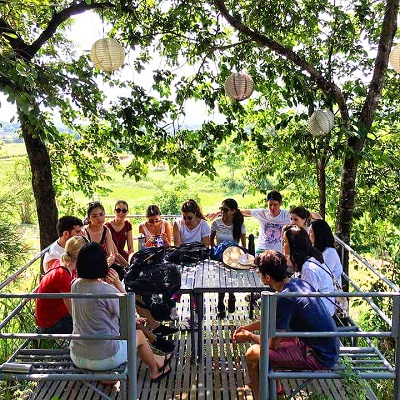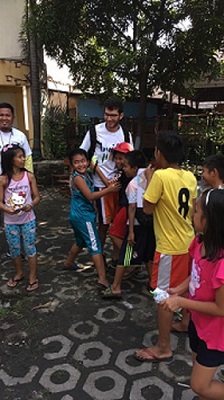Four Reasons Why Learning How to Manage for Social Impact is Crucial to Marketers

This past summer, a group of ESCP Business School students from the MSc in Marketing & Creativity postgraduate programme (MMK) travelled to the Philippines to work for a grassroots NGO, called Gawad Kalinga, started by Filipinos for Filipinos to end poverty through an inclusive sustainable development approach.
Their mission? To engage in asocial impact project that would reframe daily challenges into opportunities and ultimately drive innovative change in the Philippines.

Many may wonder why a postgraduate course focused on marketing and creativity would encourage its students to travel overseas to engage in social development missions. The directors of the MSc in Marketing & Creativity introduced the concept in its very first year in 2010, when a dozen students travelled to Uganda to help support local organisations. The following year was the first year the MMK introduced its mandatory module ‘Managing for Social Impact’.
We spoke to the Directors and faculty behind the MMK, as well as students and alumni, to discover the true value of this module:
- Social impact strategies are on the rise
Dr Chiara Ambrosino is a Senior Advisor at iDE and guest lecturer and module coordinator at ESCP Business School, where she teaches the ‘Managing for Social Impact’ module. “The obvious reason we are teaching this course is because we are seeing more companies interested in social change and impact,” says Dr Ambrosino. “As marketing professionals, our students need to be able to understand and develop that.”

Brands with a social cause have certainly risen in popularity over the last decade. Companies understand that consumers now prefer to spend money with brands that “give back”, as it shows that the business is focused on a healthier and more productive world. This is crucial for marketers to understand, as it gives consumers a larger reason to consume. With this in mind, many brands now have departments dedicated to this initiative; some label them as Corporate Social Responsibility, while others see that label as too restrictive, or PR-driven.
Peter Stephenson-Wright, MSc in Marketing & Creativity Programme Director, adds that “Managing for Social Impact skills make a candidate more employable; corporations increasingly accept that they should focus on their social impact, but find there are few in middle and senior management positions with the necessary skills or experience.”
As the overlapping interest in profit and social becomes greater than ever, marketers entering the workforce need to be expected to know and discuss those issues.
- The world is facing huge challenges
As alluded to above, it’s crucial that marketers understand the increasingly detrimental challenges the world is facing.
Unlike other marketing master degrees, the MMK focuses on real-world problems in marketing and beyond. “During the programme, I loved being constantly connected to the real world,” acclaims Aurelien Lemasson, who travelled to Uganda to complete his project. The course on Managing for Social Impact does just that by tackling global challenges in class. “We discuss poverty throughout the module, a session is dedicated to the BoP (base of the pyramid), their challenges and opportunities,” elaborates Dr Ambrosino. The module also covers topics like malnutrition (Danone-Danimal), tackling malaria, and the carbon credits market and climate change.
A huge aspect of the module is completing a social impact consultancy project, whether that be overseas (Philippines, Uganda, Haiti, etc.), or locally in London. Dr Ambrosino states that when on these missions, the students experience issues discussed first-hand. “It’s not only important that they understand what’s happening in the world, but that they develop empathy to these global issues.”

According to Zayneb Kadiri, Beatriz Camborda Mendoza, Paolo Gagliardo, Francesca Tombetti, and Masa Milhem – all ESCP Business School students who participated in the Philippines mission – working overseas instilled in them the “emotional aspect that [could not have been] taught at ESCP Business School.” They noted that the module allowed them to feel connected with each other and the issues at hand. Also participating in the Philippines project were: Anouchée Khochtinat, Andrea Giubilato and Karlee Zhang.
Some of the students are so inspired by their experience abroad that it leads them to a career focused on global issues. “This made me consider working at a global organisation’s marketing department,” Aurelien Lemasson enthuses.
Professor Marie Taillard, Academic Director of the MSc in Marketing & Creativity programme, adds that “as management educators, we have a responsibility to instil strong social values in our students, particularly in marketing.
“We want them to reflect on the social impact of the decisions they will make as managers. Whether it’s to do with labour issues, diversity and equal opportunity and access, poverty, education and of course the environment, these considerations must be at the centre of their decision-making. We work on developing this kind of mindset throughout the MSc in Marketing & Creativity programme.”
- Lack of resources pushes students to think even more creatively than ever
But the ‘Managing for Social Impact’ module is particularly important to the MSc in Marketing& Creativity programme specifically. Indeed, according to Professor Taillard and Dr Ambrosino, working in under developed countries or in contexts with fewer resources forces students to be creative.

When asked if she’s finding more creativity in developing countries, Dr Ambrosino responded: “Yes, definitely! Sometimes I think farmers in third world countries can be the most creative people. They work with whatever they have. Their lives depend on finding solutions to all sorts of problems they might encounter.”
While in the Philippines, Zayneb and her friends were particularly impressed by a French entrepreneur, Fabien Courteille, who created a social organisation called Plush and Play. After he noticed that children didn’t have access to toys but that most of the women knew how to sew, he created a company that employed these women to sew stuffed toys. Plush and Play created many jobs for the women in the community and allowed the children to play.
During his time in Uganda, Aurelien Lemasson helped create a durable and profitable business plan for an association which treats both the physical and mental effects of being HIV positive. Other associations, he said, functioned through donations creating an unstable financial situation. Aurelien explains that by getting the patients involved in a profitable activity by teaching them about business and knitting, “these products could then be sold to the population to create a more stable source of revenue. This idea, though creative, was ambitious, and that was our role: to help bring it to reality.”
According to the students, creativity in these circumstances really comes from figuring out how to make the people who have few resources – “at the base of the pyramid” – take control and become productive.
Professor Taillard has observed throughout the years that when coming back from these missions, students exert a more innovative approach in class than before. “I certainly notice that they are more willing to take risks and more apt to look beyond obvious solutions. Being in an environment in which everything we take for granted in our daily lives is suddenly challenged cannot help but drastically change the way we approach problems and challenges. This is what I see as the main change among the students who come back from these projects. They seem to be more flexible and nimble in their thinking and their approach.”
4. Companies are increasingly looking for their employees to be experts across all sectors
 According to Dr Ambrosino, today, companies of all sizes and types (private, non-profit, governmental) are increasingly looking for employees who can work across sectors. She references an article from Harvard Business Review, which states that “if the new jobs that are emerging are increasingly hybrid, then [the programmes of] study may need to become hybridised as well.”
According to Dr Ambrosino, today, companies of all sizes and types (private, non-profit, governmental) are increasingly looking for employees who can work across sectors. She references an article from Harvard Business Review, which states that “if the new jobs that are emerging are increasingly hybrid, then [the programmes of] study may need to become hybridised as well.”
In other words, it’s important to Dr Ambrosino and her colleagues that they educate the next leaders to be flexible and capable of moving from one function to the next. “Cross-functional and cross-sectoral movement is happening more and more and our students need to be ready.”
According to another Harvard Business Review article, when leaders move across sectors (business to non-profit, to government), they “acquire elements of all three skill sets, and as they apply their growing array of tools and tactics to new challenges, they strengthen their ability to work effectively across the sectors. “The Managing for Social Impact module certainly plays a crucial role in allowing students to see problems from different perspectives and making them more adaptable, no matter what the challenges presented to them.
Managing for Social Impact and the projects associated with it have certainly been a success amongst the MMK students. Aurelien Lemasson was undoubtedly deeply moved by his experience in Uganda: “Before landing in Entebbe, my idea of Uganda was based on stereotypes and vague memories I had of documentaries I’d seen. I was so excited to discover this new world, and knew even before starting that this would affect me both professionally and personally.” He highly encourages his fellow classmates to embark on this life-changing experience.
To find out about how Managing for Social Impact inspired another ESCP Business School MSc in Marketing & Creativity Graduate, check out Ana Marcella Succla’s Career Spotlight on working for an NGO in Peru.





